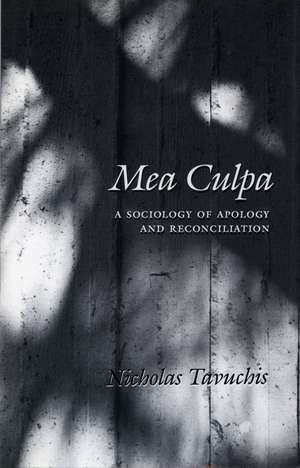Mea Culpa: A Sociology of Apology and Reconciliation
Autor Nicholas Tavuchisen Limba Engleză Paperback – 30 noi 1993
What is apology? What are its functions and its essential and variable elements? How do apologies differ from excuses, disclaimers, and justifications? What form does apology take in our own culture and in other cultures such as Japan? These are some of the major questions addressed in this attempt to shed light on a familiar but neglected dimension of social life. "Mea Culpa is an important book. Tavuchis considers apologies between individuals, individuals and groups, and between groups ... His analysis is broad and interdisciplinary, drawing from sociology, philosophy, sociolinguistics, social psychology, anthropology, philology, law, and religion ... Tavuchis utilizes verbatim texts (from newspapers, novels, letters, press conferences) to develop his theory. He is particularly brilliant on the work of Erving Goffman ... Mea Culpa is a valuable contribution to social science."—American Journal of Sociology
Preț: 199.15 lei
Nou
Puncte Express: 299
Preț estimativ în valută:
38.11€ • 39.53$ • 31.78£
38.11€ • 39.53$ • 31.78£
Carte disponibilă
Livrare economică 06-20 martie
Livrare express 19-25 februarie pentru 21.93 lei
Preluare comenzi: 021 569.72.76
Specificații
ISBN-13: 9780804722230
ISBN-10: 0804722234
Pagini: 196
Dimensiuni: 140 x 216 x 18 mm
Greutate: 0.27 kg
Ediția:1
Editura: Stanford University Press
Colecția Stanford University Press
ISBN-10: 0804722234
Pagini: 196
Dimensiuni: 140 x 216 x 18 mm
Greutate: 0.27 kg
Ediția:1
Editura: Stanford University Press
Colecția Stanford University Press
Recenzii
"A book of elegance and grace in the grand sociological tradition, this work could become a classic. Tavuchis forces readers to recognize that all human contact is ultimately dyadic. . . . Apology in Japan is compared to its expression in the West, as is, to a lesser extent, secular apology and religious confession. The normative community, sacred or secular, required definitions of exactly what is forgivable and what is not; Tavuchis uses the perspective of Georg Simmel to examine this construct."—Choice
Textul de pe ultima copertă
“A book of elegance and grace in the grand sociological tradition, this work could become a classic. Tavuchis forces readers to recognize that all human contact is ultimately dyadic. . . . Apology in Japan is compared to its expression in the West, as is, to a lesser extent, secular apology and religious confession. The normative community, sacred or secular, required definitions of exactly what is forgivable and what is not; Tavuchis uses the perspective of Georg Simmel to examine this construct.”—Choice
Descriere
Drawing upon the insights of several disciplines, this work focuses on the structural and experiential dynamics of interpersonal and collective apologetic discourse as means of tempering antagonisms and resolving conflicts in contemporary Western society.














